广西中峰乡育才中学八年级英语(外研版)上册教学课件:Module11 Unit 2 In England, you usually drink tea with milk (共21张PPT)
文档属性
| 名称 | 广西中峰乡育才中学八年级英语(外研版)上册教学课件:Module11 Unit 2 In England, you usually drink tea with milk (共21张PPT) |  | |
| 格式 | zip | ||
| 文件大小 | 1.5MB | ||
| 资源类型 | 教案 | ||
| 版本资源 | 外研版 | ||
| 科目 | 英语 | ||
| 更新时间 | 2016-10-16 22:29:18 | ||
图片预览

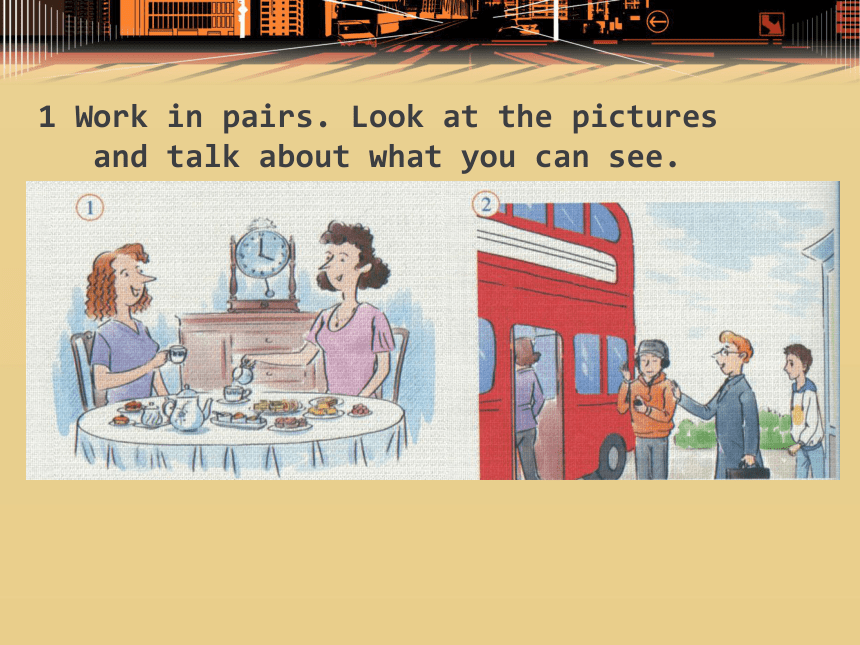
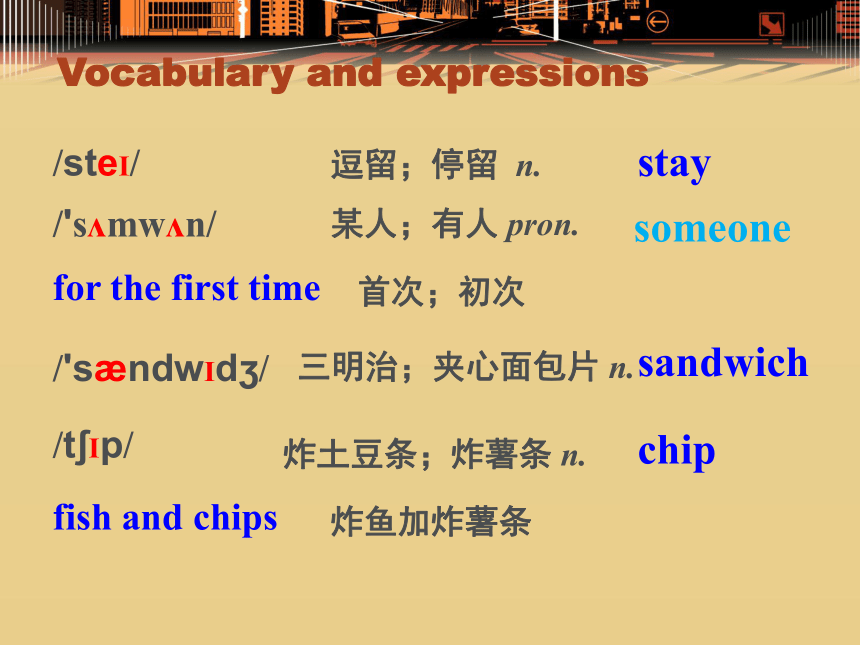
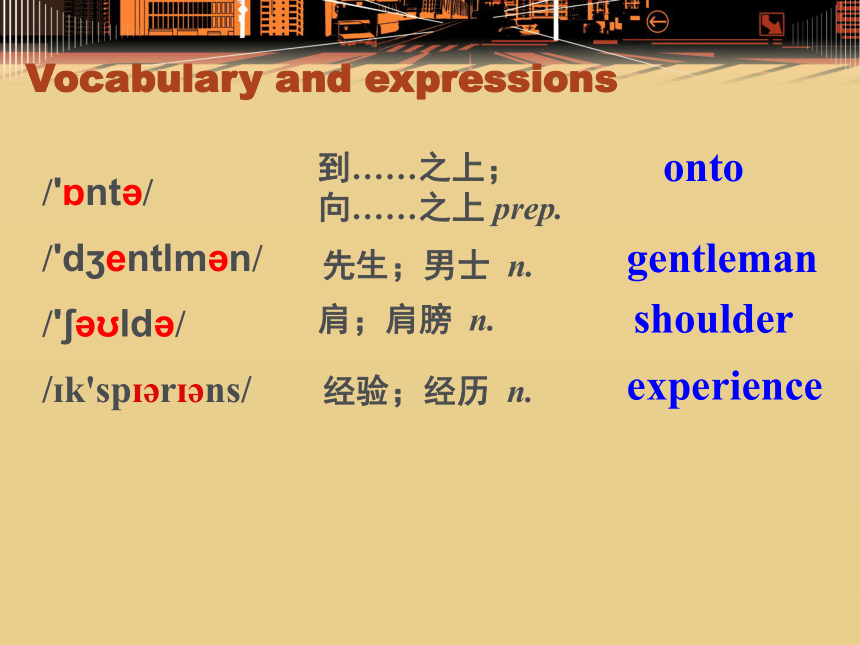
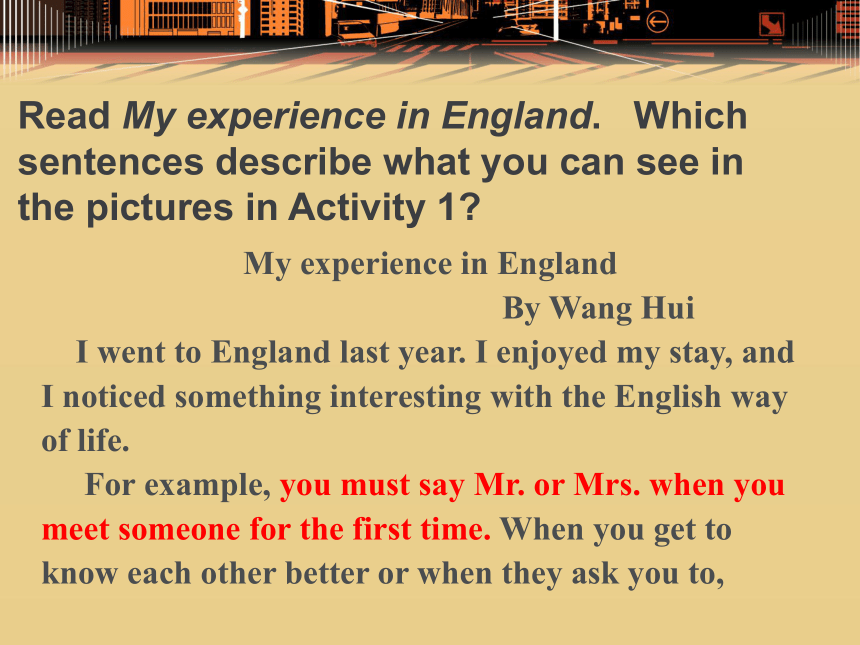

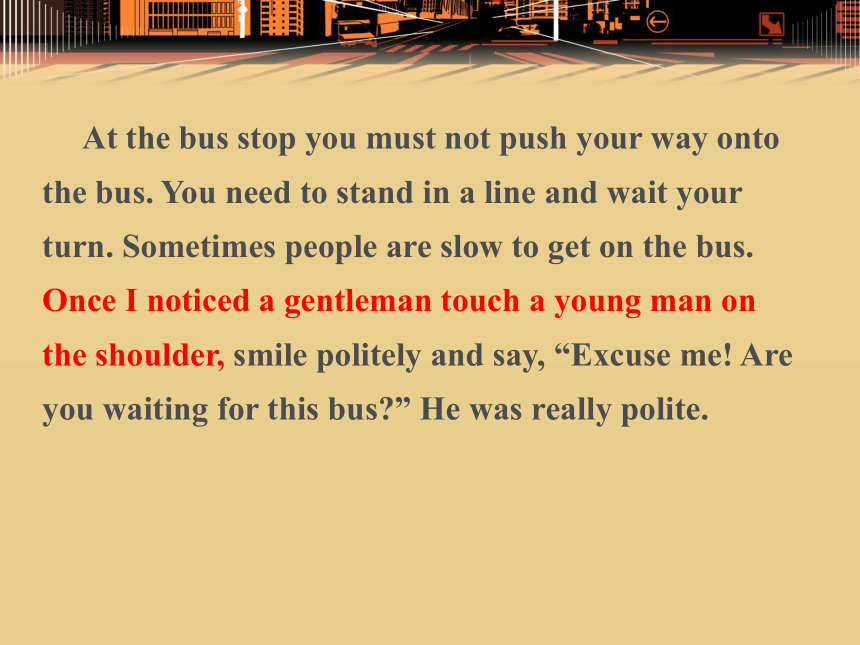

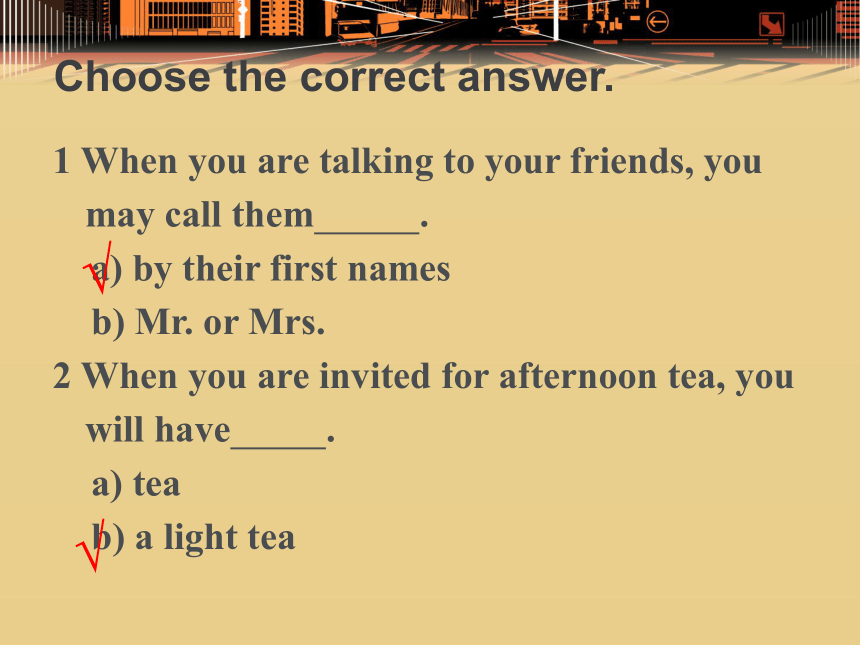
文档简介
课件21张PPT。Module 11 Way of lifeUnit 2 In England you usually drink tea with milk梅溪初中 凌璇1 Work in pairs. Look at the pictures
and talk about what you can see. Vocabulary and expressions/steI/
/'s?mw?n/
for the first time
/'s?ndwId?/
/t?Ip/
fish and chips逗留;停留 n.stay某人;有人 pron. 首次;初次chip三明治;夹心面包片 n.炸土豆条;炸薯条 n.sandwich炸鱼加炸薯条someone
/'?nt?/
/'d?entlm?n/
/'???ld?/
/?k'sp??r??ns/
先生;男士 n.gentlemanshoulder肩;肩膀 n.onto到……之上;向……之上 prep.经验;经历 n.experienceVocabulary and expressionsRead My experience in England. Which sentences describe what you can see in the pictures in Activity 1? My experience in England
By Wang Hui
I went to England last year. I enjoyed my stay, and I noticed something interesting with the English way of life.
For example, you must say Mr. or Mrs. when you meet someone for the first time. When you get to know each other better or when they ask you to, you can just use their first names.
One day we visited some friends and had afternoon tea together. Afternoon tea is not just a drink but a light meal at around 4 pm. We ate sandwiches and a large fruit cake. In England, you usually drink tea with milk. So I tried to drink tea with milk too.
Fish and chips is the traditional food in England. You can buy it and eat it in special fish and chip shops on the high street, or you can take it away and eat it with your fingers! It is delicious!
At the bus stop you must not push your way onto the bus. You need to stand in a line and wait your turn. Sometimes people are slow to get on the bus. Once I noticed a gentleman touch a young man on the shoulder, smile politely and say, “Excuse me! Are you waiting for this bus?” He was really polite. We visited some friends and had afternoon tea together.
Once I noticed a gentleman touch a young man on his shoulder, smile and say... Choose the correct answer.1 When you are talking to your friends, you may call them .
a) by their first names
b) Mr. or Mrs.
2 When you are invited for afternoon tea, you will have .
a) tea
b) a light tea
√√3 If you drink tea in England, it will usually
contain .
a) milk b) sugar
4 The traditional food in England is .
a) steak and potatoes
b) fish and chips
5 At a bus stop, it is important that you .
a) wait in line b) smile politely
√√√Laguage pointsand I noticed something interesting with the English way of life.
notice sb. do sth 注意某人做过某事
notice sb. doing sth 注意某人正在做某事
For example, you must say Mr. or Mrs. when you meet someone for the first time.
for example 比如、例如【后面既可接句子也可接名词、代词、动名词】
such as 比如、例如【后只可接名词、代词、动名词】Laguage pointsor you can take it away and eat it with your fingers!
take away 带走【如果宾语是代词,只能放在take 和away的中间】
You need to stand in a line and wait your turn.
need v. 需要
need sth. 需要某物
need to do sth. 需要做某事Laguage pointsGrammer:情态动词must,need, can的用法For example, you must say Mr. or Mrs. when you meet someone for the first time.
must 【情态动词】 必须 (否定形式:must not=musn't)
need【情态动词】 需要(否定形式:need not=needn't)
can【情态动词】可以,能够(cannot=can't)
肯定句:must/need/can +V+其他
否定句:must/need/can +not +V+其他
一般疑问句:将情态动词提于句首,其他不变(一提,二变,三问号)
----?Must?we?hand?in?our?exercise?books?today????
----?Yes,?you?must.???
----?No,?you?don’t?have?to?/?you?needn’t.
【在回答引出的问句时,如果是否定的,不能用mustn’t(禁止,不准),而用needn’t, don’t have to(不必)】
-----Can I go now?
----- Yes, you can. / No, you can’t. Grammer:情态动词must,need, can的用法 ---- Need I finish the work today?
---- Yes, you must. / No, you needn’t.
【need 作情态动词用时, 常用于疑问句、否定句。在肯定句中一般用must, have to, ought to, should代替】Grammer:情态动词must,need, can的用法Exercises翻译句子?
1.?在中国,新年的第一天你不可以打扫卫生。
???In?China?,?you?_________________?cleaning?_______________?
of?New?Year?.
2.?当你收到礼物时必须用双手.
???When?you?get?a?present,?you??____________________?your?both?hands.
3.?我们可以用左手吃饭.
???We?_______?eat??meals?_______?our?left?hands.mustn'tat the first daymust accept withcanwith4.?我们不可以把垃圾扔到街上.
???We?_____________________________?in?the?street.
5.?在美国,当有人给你礼物时,你要立即打开。
???In?the?USA,?when?someone?gives?you?a?present,?you?_______________________
Exercisescan't throw rubbishcan open it immediatelyHomeworkWrite answers to the questions in activity 4.
Write a passage about way of life in your hometown.Ending wordsGenius is one percent inspiration and ninety-nine percent perspiration.
天才是百分之九十九的汗水加上百分之一的天赋。Thank you
and talk about what you can see. Vocabulary and expressions/steI/
/'s?mw?n/
for the first time
/'s?ndwId?/
/t?Ip/
fish and chips逗留;停留 n.stay某人;有人 pron. 首次;初次chip三明治;夹心面包片 n.炸土豆条;炸薯条 n.sandwich炸鱼加炸薯条someone
/'?nt?/
/'d?entlm?n/
/'???ld?/
/?k'sp??r??ns/
先生;男士 n.gentlemanshoulder肩;肩膀 n.onto到……之上;向……之上 prep.经验;经历 n.experienceVocabulary and expressionsRead My experience in England. Which sentences describe what you can see in the pictures in Activity 1? My experience in England
By Wang Hui
I went to England last year. I enjoyed my stay, and I noticed something interesting with the English way of life.
For example, you must say Mr. or Mrs. when you meet someone for the first time. When you get to know each other better or when they ask you to, you can just use their first names.
One day we visited some friends and had afternoon tea together. Afternoon tea is not just a drink but a light meal at around 4 pm. We ate sandwiches and a large fruit cake. In England, you usually drink tea with milk. So I tried to drink tea with milk too.
Fish and chips is the traditional food in England. You can buy it and eat it in special fish and chip shops on the high street, or you can take it away and eat it with your fingers! It is delicious!
At the bus stop you must not push your way onto the bus. You need to stand in a line and wait your turn. Sometimes people are slow to get on the bus. Once I noticed a gentleman touch a young man on the shoulder, smile politely and say, “Excuse me! Are you waiting for this bus?” He was really polite. We visited some friends and had afternoon tea together.
Once I noticed a gentleman touch a young man on his shoulder, smile and say... Choose the correct answer.1 When you are talking to your friends, you may call them .
a) by their first names
b) Mr. or Mrs.
2 When you are invited for afternoon tea, you will have .
a) tea
b) a light tea
√√3 If you drink tea in England, it will usually
contain .
a) milk b) sugar
4 The traditional food in England is .
a) steak and potatoes
b) fish and chips
5 At a bus stop, it is important that you .
a) wait in line b) smile politely
√√√Laguage pointsand I noticed something interesting with the English way of life.
notice sb. do sth 注意某人做过某事
notice sb. doing sth 注意某人正在做某事
For example, you must say Mr. or Mrs. when you meet someone for the first time.
for example 比如、例如【后面既可接句子也可接名词、代词、动名词】
such as 比如、例如【后只可接名词、代词、动名词】Laguage pointsor you can take it away and eat it with your fingers!
take away 带走【如果宾语是代词,只能放在take 和away的中间】
You need to stand in a line and wait your turn.
need v. 需要
need sth. 需要某物
need to do sth. 需要做某事Laguage pointsGrammer:情态动词must,need, can的用法For example, you must say Mr. or Mrs. when you meet someone for the first time.
must 【情态动词】 必须 (否定形式:must not=musn't)
need【情态动词】 需要(否定形式:need not=needn't)
can【情态动词】可以,能够(cannot=can't)
肯定句:must/need/can +V+其他
否定句:must/need/can +not +V+其他
一般疑问句:将情态动词提于句首,其他不变(一提,二变,三问号)
----?Must?we?hand?in?our?exercise?books?today????
----?Yes,?you?must.???
----?No,?you?don’t?have?to?/?you?needn’t.
【在回答引出的问句时,如果是否定的,不能用mustn’t(禁止,不准),而用needn’t, don’t have to(不必)】
-----Can I go now?
----- Yes, you can. / No, you can’t. Grammer:情态动词must,need, can的用法 ---- Need I finish the work today?
---- Yes, you must. / No, you needn’t.
【need 作情态动词用时, 常用于疑问句、否定句。在肯定句中一般用must, have to, ought to, should代替】Grammer:情态动词must,need, can的用法Exercises翻译句子?
1.?在中国,新年的第一天你不可以打扫卫生。
???In?China?,?you?_________________?cleaning?_______________?
of?New?Year?.
2.?当你收到礼物时必须用双手.
???When?you?get?a?present,?you??____________________?your?both?hands.
3.?我们可以用左手吃饭.
???We?_______?eat??meals?_______?our?left?hands.mustn'tat the first daymust accept withcanwith4.?我们不可以把垃圾扔到街上.
???We?_____________________________?in?the?street.
5.?在美国,当有人给你礼物时,你要立即打开。
???In?the?USA,?when?someone?gives?you?a?present,?you?_______________________
Exercisescan't throw rubbishcan open it immediatelyHomeworkWrite answers to the questions in activity 4.
Write a passage about way of life in your hometown.Ending wordsGenius is one percent inspiration and ninety-nine percent perspiration.
天才是百分之九十九的汗水加上百分之一的天赋。Thank you
同课章节目录
- Module 1 How to learn English
- Unit 1 Let's try to speak English as much as possi
- Unit 2 You should smile at her.
- Unit 3 Language in use .
- Module 2 My home town and my country
- Unit 1 It's taller than many other buildings.
- Unit 2 Cambridge is a beautiful city in the east o
- Unit 3 Language in use .
- Module 3 Sports.
- Unit 1 Nothing is more exciting than playing tenni
- Unit 2 This year we training more carefully.
- Unit 3 Language in use .
- Module 4 Planes, ships and trains .
- Unit 1 He lives the farthest from school.
- Unit 2 What is the best way to travel.
- Unit 3 Language in use .
- Module 5 Lao She Teahouse.
- Unit 1 I wanted to see the Beijing Opera.
- Unit 2 It descibes the changes in Chinese society.
- Unit 3 Language in use .
- Module 6 Animals in danger.
- Unit 1 It allows people to get closer to them .
- Unit 2 The WWF is working hard to save them all.
- Unit 3 Language in use .
- Revision module A
- Module 7 A famous story
- Unit 1 Alice was sitting with her sister by the ri
- Unit 2 She was thinking about her cat.
- Unit 3 Language in use .
- Module 8 Accidents
- Unit 1 While the car were changing to red, a car s
- Unit 2 I was trying to pick it up when it bite me
- Unit 3 Language in use .
- Module 9 Population
- Unit 1 The population of China is about 1.37 billi
- Unit 2 Arnwick was a city with 200,000 people.
- Unit 3 Language in use .
- Module 10 The weathe
- Unit 1 It might snow.
- Unit 2 The weather is fine all year round.
- Unit 3 Language in use .
- Module 11 Way of life
- Unit 1 In China ,we open a gift later.
- Unit 2 In England, you usually drink tea with milk
- Unit 3 Language in use .
- Module 12 Help
- Unit 1 What should we do before help arrives?
- Unit 2 Stay away from windows and heavy furniture.
- Unit 3 Language in use .
- Revision module B
